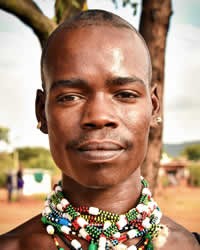Banna in Ethiopia

Photo Source:
Rod Waddington - Flickr
Creative Commons
|
Send Joshua Project a map of this people group.
|
| People Name: | Banna |
| Country: | Ethiopia |
| 10/40 Window: | Yes |
| Population: | 52,000 |
| World Population: | 52,000 |
| Primary Language: | Hamer-Banne |
| Primary Religion: | Ethnic Religions |
| Christian Adherents: | 3.00 % |
| Evangelicals: | 1.30 % |
| Scripture: | New Testament |
| Ministry Resources: | Yes |
| Jesus Film: | Yes |
| Audio Recordings: | Yes |
| People Cluster: | Omotic |
| Affinity Bloc: | Horn of Africa Peoples |
| Progress Level: |
|
Introduction / History
The Hamer-Banna are shepherds living in the highlands of southwest Ethiopia. The Hamer-Banna consist of two separate ethnic groups, the Hamer and the Banna, who speak virtually the same language. Though they refer to themselves as either Hamer or Banna, they call their language Hamer-Banna. They belong to a group of culturally distinct people known as the Sidamo. Although they are racially mixed with the Bushman hunters who originally inhabited the region, they do not have Bushman features.
Where Are they Located?
They are primarily located in the Gemu Gofa province, which is east of the Omo River and north of Lake Turkana. This area, called the Lower Omo region, has remained one of the most inaccessible and least developed parts of East Africa.
What Are Their Lives Like?
The Hamer-Banna live in camps that consist of several related families. The families live in tents arranged in a circle, and the cattle are brought into the center of the camp at night. When the campsite is being set up, beds for the women and young children are built first; then the tent frame is built around it. The tents are constructed with flexible poles set in the ground in a circular pattern. The poles are bent upward, joining at the top, and then tied. The structures are covered with thatch during the dry season and canvas mats during the rainy season. Men and older boys usually sleep on cots in the center of the camp, near the cattle.
Livestock belonging to the Hamer-Banna consist mainly of cattle, although there are some sheep and goats. Camels are used for riding and as pack animals. Most Hamer-Banna plant fields of sorghum at the beginning of the rainy season before leaving on their annual nomadic journey. Some households also plant sesame and beans. Because the crops are usually left unattended, the yields are low. Few households grow enough grain to last through the year.
One striking characteristic of the Hamer-Banna men is that they indulge in elaborate hair-dressing. They wear a clay "cap" that is painted and decorated with feathers and other ornaments. Much time is spent in preparing the hair, and care must be taken to protect it from damage. This is one reason the men often sleep on small, cushioned stools. A well-dressed man will wear a toga-like cloth and carry a spear and a stool. Women also commonly wear colorful toga-like garments.
Men may marry as many women as they like, but only within their own tribe. A "bride price" of cattle and other goods is provided by the prospective husband and his near relatives. A typical household consists of a woman, her children, and a male protector. A man may be the protector of more than one household, depending on the number of wives he has. Also, men are sometimes assigned the responsibility of protecting a divorced woman, a widow, or the wife of an absent husband (usually his brother). Marriage celebrations include feasting and dancing. Girls as well as boys are circumcised.
What Are Their Beliefs?
The Banna are mainly adherents to traditional religions. For instance, they believe that natural objects (rocks, trees, etc.) have spirits. They also believe in jinnis, or spirits that are capable of assuming human or animal form and exercising supernatural influence over people.
What Are Their Needs?
The New Testament is available in the Hamer-Banna language in both print and audio, and the JESUS Film is available. More laborers and evangelistic tools are needed; however, prayer is the key to reaching them with the gospel.
Prayer Points
Pray for workers who are filled with the fruit and the power of the Holy Spirit to go to the Banna people in Ethiopia.
Pray for his kingdom to come and his will to be done among the Banna people of Ethiopia.
Pray for a movement of Banna households to study the Bible and accept the blessings of Christ.
Pray for a spiritual hunger that will drive the Banna people to the arms of Jesus.